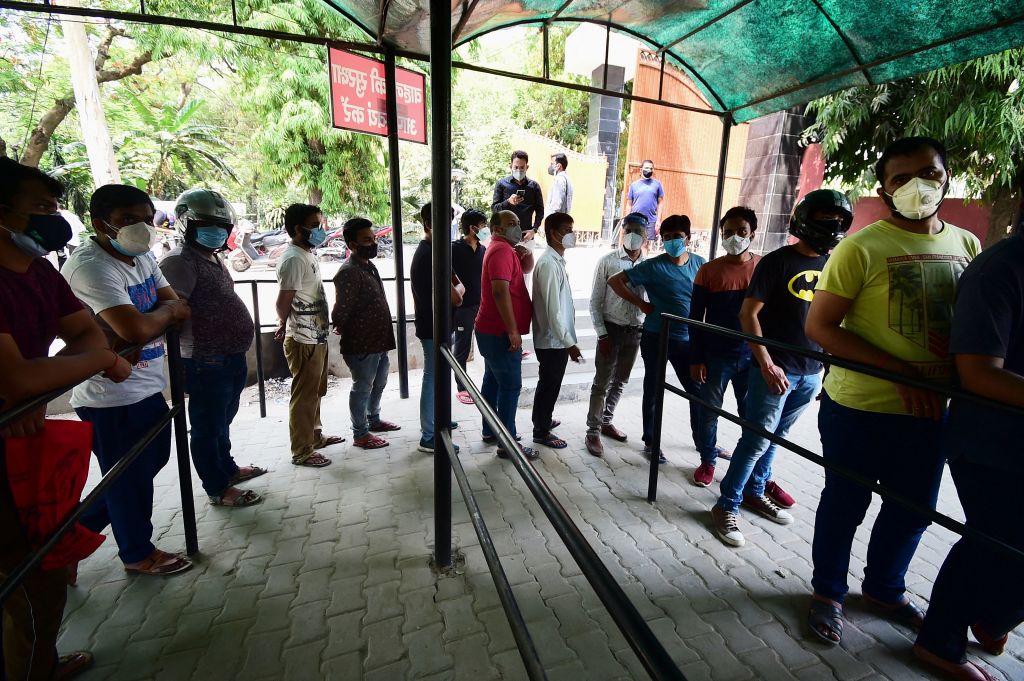India records 400,000 COVID-19 cases in a day for first time as surge worsens


A free daily email with the biggest news stories of the day – and the best features from TheWeek.com
You are now subscribed
Your newsletter sign-up was successful
India surpassed 400,000 confirmed COVID-19 cases in a 24-hour period for the first time on Saturday, marking yet another global daily infection record. The country recorded 3,523 deaths during the same span, which experts believe to be an undercount, Al Jazeera reports. Additionally, a fire broke out in a COVID-19 hospital ward in western India, reportedly killing 16 patients and two staff members.
As the surge worsens, several countries, including the United States, have restricted travel from India. The U.S., which has also been delivering pandemic-related supplies to the country, will officially implement the travel ban on May 4 "in light of extraordinarily high COVID-19 caseloads and multiple variants circulating" there, the White House confirmed Friday. The policy won't apply to American citizens, lawful permanent residents, or others with exemptions, nor will it apply to humanitarian workers.
The White House said the administration was taking this step based on advice from the Centers for Disease Control and Prevention, though former Food and Drug Administration Commissioner Scott Gottlieb told CNBC on Friday that the move likely won't affect the U.S.'s coronavirus trajectory, which he's generally optimistic about. "It's probably going to do more harm to India than any good that it attributes to us," Gottlieb said, adding that a highly contagious variant first identified in India is already circulating in the U.S. and "the best way to reduce the risk of that variant is, frankly, to get more Americans vaccinated ... not restricting travel at this point." Read more at Al Jazeera and CNBC.
The Week
Escape your echo chamber. Get the facts behind the news, plus analysis from multiple perspectives.

Sign up for The Week's Free Newsletters
From our morning news briefing to a weekly Good News Newsletter, get the best of The Week delivered directly to your inbox.
From our morning news briefing to a weekly Good News Newsletter, get the best of The Week delivered directly to your inbox.
A free daily email with the biggest news stories of the day – and the best features from TheWeek.com
Tim is a staff writer at The Week and has contributed to Bedford and Bowery and The New York Transatlantic. He is a graduate of Occidental College and NYU's journalism school. Tim enjoys writing about baseball, Europe, and extinct megafauna. He lives in New York City.
-
 How the FCC’s ‘equal time’ rule works
How the FCC’s ‘equal time’ rule worksIn the Spotlight The law is at the heart of the Colbert-CBS conflict
-
 What is the endgame in the DHS shutdown?
What is the endgame in the DHS shutdown?Today’s Big Question Democrats want to rein in ICE’s immigration crackdown
-
 ‘Poor time management isn’t just an inconvenience’
‘Poor time management isn’t just an inconvenience’Instant Opinion Opinion, comment and editorials of the day
-
 Trump HHS slashes advised child vaccinations
Trump HHS slashes advised child vaccinationsSpeed Read In a widely condemned move, the CDC will now recommend that children get vaccinated against 11 communicable diseases, not 17
-
 FDA OKs generic abortion pill, riling the right
FDA OKs generic abortion pill, riling the rightSpeed Read The drug in question is a generic version of mifepristone, used to carry out two-thirds of US abortions
-
 RFK Jr. vaccine panel advises restricting MMRV shot
RFK Jr. vaccine panel advises restricting MMRV shotSpeed Read The committee voted to restrict access to a childhood vaccine against chickenpox
-
 Texas declares end to measles outbreak
Texas declares end to measles outbreakSpeed Read The vaccine-preventable disease is still spreading in neighboring states, Mexico and Canada
-
 RFK Jr. shuts down mRNA vaccine funding at agency
RFK Jr. shuts down mRNA vaccine funding at agencySpeed Read The decision canceled or modified 22 projects, primarily for work on vaccines and therapeutics for respiratory viruses
-
 Measles cases surge to 33-year high
Measles cases surge to 33-year highSpeed Read The infection was declared eliminated from the US in 2000 but has seen a resurgence amid vaccine hesitancy
-
 Kennedy's vaccine panel signals skepticism, change
Kennedy's vaccine panel signals skepticism, changeSpeed Read RFK Jr.'s new vaccine advisory board intends to make changes to the decades-old US immunization system
-
 Kennedy ousts entire CDC vaccine advisory panel
Kennedy ousts entire CDC vaccine advisory panelspeed read Health Secretary RFK Jr. is a longtime anti-vaccine activist who has criticized the panel of experts
